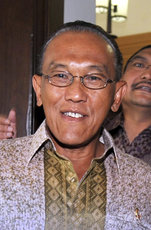 Will Oliver/Agence France-Presse — Getty ImagesNathaniel Rothschild is heir to one of Europe’s banking families.
Will Oliver/Agence France-Presse — Getty ImagesNathaniel Rothschild is heir to one of Europe’s banking families.
LONDON — The battle for control over the mining company Bumi reached a climax on Thursday as shareholders voted against a major board change proposed by the British financier Nathaniel Rothschild.
The decision signifies the end of a feud that lasted months between Mr. Rothschild, heir to one of Europe’s banking families, and the Indonesian Bakrie family dynasty for control of coal mining assets across the Southeast Asian country.
In an acrimonious battle that had become increasingly personal, Mr. Rothschild, 41, had proposed replacing 12 of Bumi’s 14 board members, including its chief executive and chairman.
The British financier planned to name his own management team, including himself, in an effort to return to Bumi’s board, from which he resigned last year.
After a two-hour shareholder meeting on Thursday, held on the grounds of the military barracks of Britain’s oldest regiment in central London, Bumi’s investors, which included major institutional shareholders as well as retail investors, rejected a majority of Mr. Rothschild’s proposed board changes.
“Is there a future for this company?” Robin Renwick, Bumi’s nonexecutive director, asked the gathered shareholders. “We have all heard a lot of doom and gloom. Absolutely, there is a future.”
The failure to replace Bumi’s board is a major setback for Mr. Rothschild, the former co-chairman of the hedge fund Atticus Capital, who co-founded Bumi in 2010 through a $3 billion deal with the Bakrie family that created the mining giant, which is listed in London.
Since the original deal was announced, little has gone right for the company. The global economic slowdown has slashed demand for coal, particularly in fast-growing emerging economies, and Bumi’s boardroom infighting has been mirrored by a 60 percent fall in the company’s share price over the last three years.
 Will Oliver/Agence France-Presse — Getty ImagesSamin Tan is to step down as chairman of Bumi.
Will Oliver/Agence France-Presse — Getty ImagesSamin Tan is to step down as chairman of Bumi.
Last year, the mining company announced an investigation into allegations of financial misconduct involving around $500 million at Bumi’s Indonesian subsidiaries. The move was quickly followed by an offer by the Bakries to acquire all of the company’s mining assets for roughly $1.2 billion.
As part of the continuing board intrigue, the Indonesia family sold a stake in Bumi late last year to Samin Tan, a fellow Indonesian mining mogul, for $1 billion. The deal helped the Bakries to repay loans owed to a consortium of banks led by Credit Suisse.
During the shareholder meeting on Thursday, Mr. Rothschild repeatedly called on Mr. Tan, who will step down as Bumi’s chairman, to answer shareholders’ questions. Despite the demands, most of the talking was left to the company’s other board members.
Talking to reporters at the sidelines of the meeting, the British financier, who was accompanied to the event by his mother, said his motivation was not directed specifically at his former Indonesian partners, but was aimed at improving the company’s stock price.
“It’s not personal,” Mr. Rothschild said before the results of the shareholder vote were announced. “The board has an enormous amount to do to win back the support of minority shareholders.”
With the British financier’s proposal rejected, Bumi said it would now focus on divesting itself of coal assets to the Bakrie Group, the family’s conglomerate, as well as on developing its remaining mining resources.
 Adek Berry/Agence France-Presse — Getty ImagesAburizal Bakrie heads the Indonesian family behind Bumi.
Adek Berry/Agence France-Presse — Getty ImagesAburizal Bakrie heads the Indonesian family behind Bumi.
The result is a personal loss for Mr. Rothschild, whose hopes of securing victory were dealt a blow this week when a major Indonesian investor connected to the Bakries sold shares worth 10 percent of Bumi’s total stock to the Indonesian media mogul Hary Tanoesoedibjo and two hedge funds.
The share sale followed a ruling by British authorities that capped the voting rights of some of Bumi’s majority Indonesian shareholders. Analysts say that by selling shares to the new investors, who were expected to vote against Mr. Rothschild’s proposals, the Bakrie family increased its chances of successfully opposing the boardroom changes.
Mr. Rothschild said on Thursday that he would retain his minority stake in Bumi.
The battle for control of Bumi could have wider implications. Aburizal Bakrie, who heads the Indonesian family, is a candidate in the country’s presidential elections next year. A potential rival for the office is Prabowo Subianto, the brother of Indonesian billionaire Hashim Djojohadikusumo, who backed Mr. Rothschild’s proposed board changes and would have joined Bumi’s board if the British financier had won shareholder backing.
Article source: http://dealbook.nytimes.com/2013/02/21/rothschild-loses-his-battle-for-control-of-mining-company-bumi/?partner=rss&emc=rss